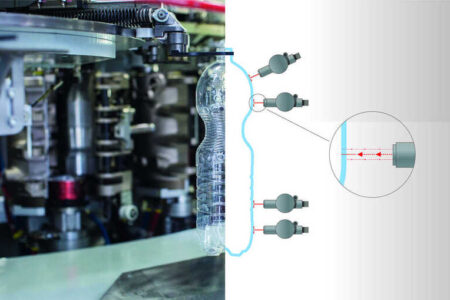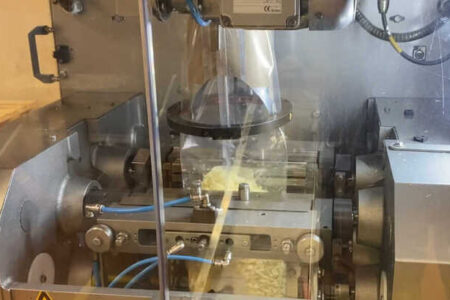KHS develops digital control system for PET bottle production

KHS Group has developed a Unit Mold Control, in order to optimise discrepancies that occur during the stretch blow moulding process of PET bottles, such as uneven distribution of material which can have an impact on the bottle quality and production efficiency.
Developed in co-operation with US company Agr International, the digital, automated process control system, connected with the KHS controller, individually regulates the respective blow stations in KHS’ InnoPET Blomax series, thus minimising any fluctuations in quality during stretch blow moulding. This results in improved bottle stability coupled with lower preform weights. This had proved something of a challenge to date, especially where containers with a high recycled PET content are used.
On a stretch blow moulder the amount of wear on the individual blow valves used can vary. In the production process this can cause discrepancies in the distribution of material resulting in differing thicknesses of the bottle wall. To date, parameters could only be adjusted for the entire machine and not for each individual station. With the new digital Unit Mold Control system manufacturers can optimise their blow molding process by making individual settings for each station.
“This enables material distribution to be more precisely controlled per station, thus minimising variations in the wall thickness from mould to mould by more than 30%,” said Frank Haesendonckx, head of technology at KHS Corpoplast.
The Unit Mold Control inspection technology constantly measures the material distribution in each bottle and adjusts the settings for optimisation automatically.
“With this system, deviations in the individual mould stations are identified. By applying an algorithm the degree of variability is reduced without operator intervention and possible incorrect settings are avoided,” said Haesendonckx. The data captured from the individual mould stations provides valuable information for the condition-based maintenance of valves, stretching systems or mould shells, for instance.
The Unit Mold Control also yields further benefits with regard to the growing percentage of recyclate used in PET bottles.
“Process accuracy reaches its limits with containers such as these,” Haesendonckx said. “As the material quality varies when recycled PET is used, the bottle becomes less stable and manufacturers have to use heavier preforms to ensure stability.”
With the new system, weights can be reduced while retaining bottle stability, claimed Haesendonckx. “Unit Mold Control effectively compensates for discrepancies by identifying any unwanted material displacement during wall thickness inspection and automatically counteracting this.”
“Our commitment to the global beverage market is to provide innovative process control solutions for the factory floor,” said Robert Cowden, COO of AGR. “In doing so we’re helping to constantly optimise processes and improve production line efficiency and productivity by reducing unplanned downtime, labour content per produced container and energy costs.”
Unit Mold Control is available as an option for KHS InnoPET Blomax Series IV and V stretch blow moulders, and can also be retrofitted into existing plant machinery.



